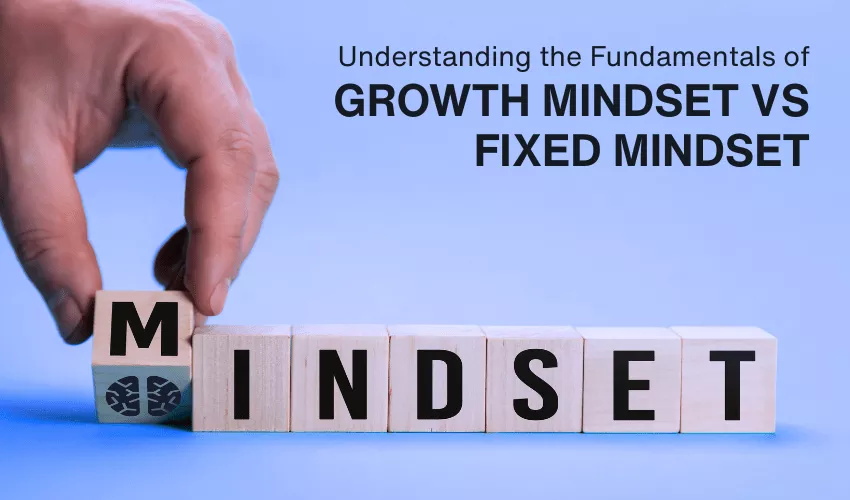
What you believe about your ability shapes what you become.
In my work with professionals and leadership teams, one truth keeps surfacing: your mindset shapes your outcomes more than your skills do. You could have all the talent and tools in the world , but without the right leadership mindset, progress stalls.
One of the most powerful mindset models I’ve come across and personally practiced and highly recommend, is the concept of the growth mindset vs the fixed mindset. Coined by psychologist Carol Dweck, this isn’t just a theoretical framework. It’s something that shows up daily , in conversations, decisions, and especially in how we handle challenges.
What Is a Fixed Mindset?
A fixed mindset believes that intelligence, talent, and ability are static. You’re either good at something or you’re not. People with this mindset tend to avoid challenges, give up easily, and view feedback as criticism.
This can quietly damage even the most experienced leadership professionals. Why? Because the fear of “not knowing” or “not being good enough” creates a ceiling. And in leadership roles, that ceiling doesn’t just limit you , it limits your team.
In a leading tech company I consulted with, a mid-level manager was struggling to adapt to a new CRM system. He openly said, "I've never been good with tools like this,” and consistently avoided training sessions. His team followed his lead, delaying implementation, depending on others, and eventually falling behind on sales targets.
This is how a fixed mindset, one that sees ability as static, quietly spreads through a team and impacts performance.
What Does a Growth Mindset Look Like?
On the other side, a growth mindset is rooted in the belief that abilities can be developed through practice, learning, and effort. People with this mindset don’t see failure as a sign of inadequacy, they rather see it as a stepping stone.
This shift in thinking is the foundation of every strong leadership mindset. Leaders who embrace a growth mindset create safe spaces for experimentation, give constructive feedback, and promote learning as a continuous journey , not merely a checkbox.
A startup founder I worked with demonstrated this brilliantly. After a failed product launch, she didn’t blame her team or refrain from future innovation. Instead, she gathered feedback, held a learning session for the entire
organization, and invited even junior team members to share suggestions. Six months later, they released a new version , which performed three times better. Her leadership wasn’t about avoiding failure, but using it to build something better.
Leadership Habits Start with Mindset
Many people talk about building the right leadership habits , time management, clear communication, and strategic thinking. But what often goes unnoticed is that the mindset behind those habits matters equally.
If your underlying belief is “I need to appear perfect,” you’ll avoid taking calculated risks. If your belief is “I can improve with effort,” you’ll build habits that stretch and strengthen your abilities. The most effective leadership habits grow out of a growth mindset, not fear, but willingness.
This becomes especially important when mentoring younger team members. Leaders with a fixed mindset may unknowingly discourage initiative by only appreciating perfect outcomes . In contrast, a leader I once trained made it a habit to acknowledge progress , even when outcomes weren’t ideal. Her junior staff felt more confident taking on stretch assignments, and several of them grew into leadership roles themselves within two years. That kind of culture doesn’t come from a checklist , it comes from mindset.
How to Shift from Fixed Mindset to Growth Mindset
Here’s the good news: mindset isn’t fixed. Most of us carry a mix of both. The goal isn’t perfection, but awareness.
Start noticing your internal dialogue. When things go wrong, do you shut down? When someone gives you feedback, do you defend or reflect? These are small but powerful indicators of whether your current leadership mindset is serving you , or holding you back.
Developing a growth mindset isn’t a one-time shift. It’s a daily choice, reinforced by reflection, courage, and consistent leadership habits.
Final Thoughts: Your Mindset is Your Leadership Foundation
In today’s fast-moving world, the ability to adapt and grow is more valuable than any one skill. Your leadership strength doesn’t lie in always having the answers , but in having the mindset to find them.
So, if there’s one shift you choose to make this week, let it be this:
Trade perfection for progress. Trade certainty for curiosity.
Because ultimately, your leadership mindset sets the tone for how you lead, how you grow, and how far you’ll go.





